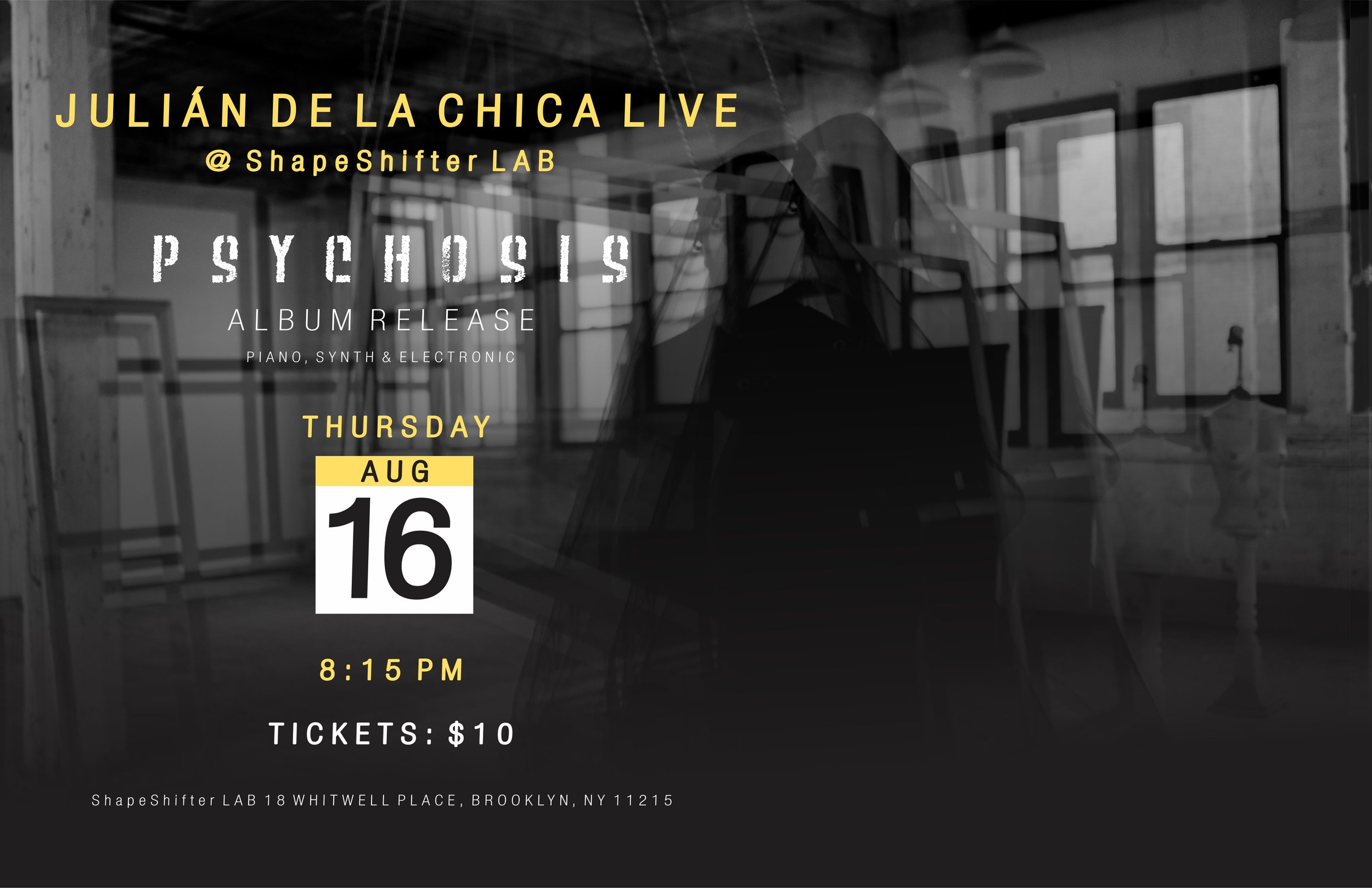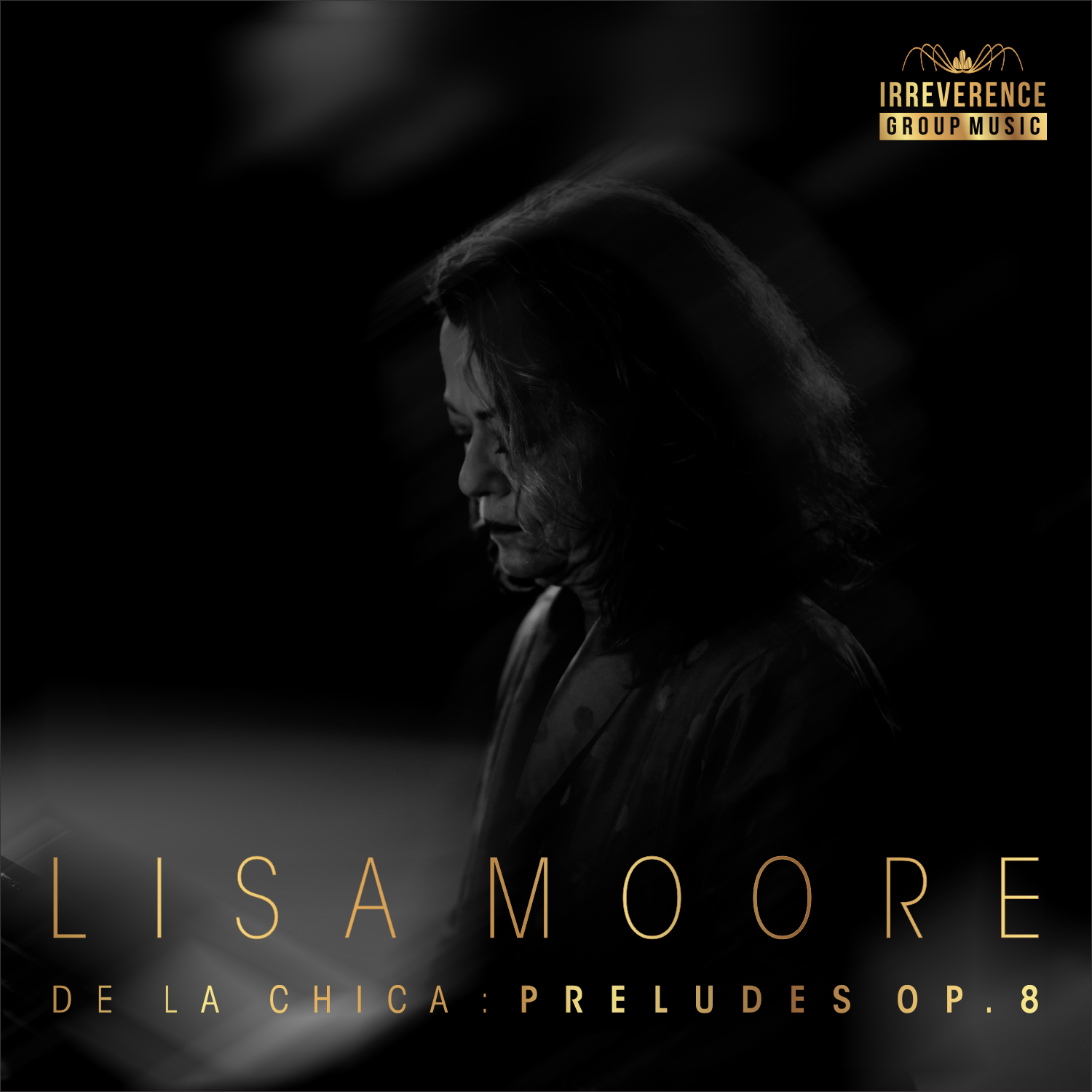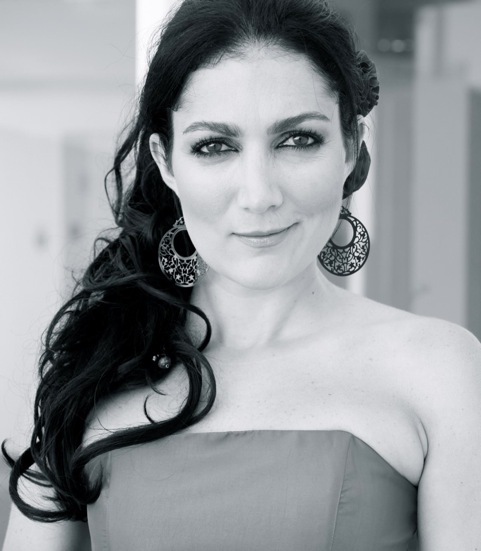My first Symphony is OUT
Irreverence Group Music presents Julián De La Chica's first Symphony — An exploration of the composer's isolation in his studio in Brooklyn, NY. This work, for an orchestra of synthesizers, rethinks European canonical definitions of genres in a new form of creation during social distancing.
Irreverence Group Music presents Julián De La Chica's first Symphony — An exploration of the composer's isolation in his studio in Brooklyn, NY. This work, for an orchestra of synthesizers, rethinks European canonical definitions of genres in a new form of creation during social distancing. "The glory of chaos. The world without time. The balance is lost and, in its decline, perpetuates our hope. Emptiness." — Julián De La Chica
The album's artwork -collage a0548 - is by Henrik Langsdorf, a German-born visual artist who divides his time between New York and Kinshasa and who De La Chica greatly admires.
Julián De La Chica Live at ShapeShifter Lab
On 16 August 2018 (Thu), at 8:15 pm, Composer and pianist Julián De La Chica will release his second solo album Psychosis a cycle for piano, synth and electronic at Brooklyn's ShapeShifter Lab. In this work, De La Chica will play for the first time a set of electronic music ranging from Modern Classical to Ambient and Minimal electronic music.
← Back to News
Thursday, 16 August, 2018, at 8:15 PM, Composer and pianist Julián De La Chica will release his second solo album Psychosis a cycle for piano, synth and electronic at Brooklyn's ShapeShifter Lab. In this work, De La Chica will play for the first time a set of electronic music ranging from Modern Classical to Ambient and Minimal electronic music.
Since always, the mind has been an intriguing world for us. The relationship between the so-called soul, the conscience, the mind and the spirit, proposes questions that we can hardly answer. "Psychosis", as a mental illness, is defined as the difficulty in determining what is real and what is not. Some of its most well known symptoms may include false beliefs and seeing or hearing things that others do not see or hear. This Cycle, for Synth, electronic and piano explores the "Psychosis"of today's virtual existence where the internet inexorably changes our reality. It explores our false beliefs, the nakedness of the obvious, the nakedness of perception.
Album Trailer:
In a world dominated by the "Social Media", the images that we create of ourselves become a parallel world in which we inhabit daily. Always waiting for a "like", waiting for acceptance, waiting for validation of our actions. It's the vanity of our other self and we become slaves of that pseudo reality. Perhaps that's how we think we're happy... we want forget that we're going to die. We all have a "psychosis", and in this album, I explore my own... — JDLCH
About Julian De La Chica:
De La Chica is a Colombian composer, pianist and record producer based in Brooklyn, NY, whose influences range from American minimalism to the alternative and electronic scene. His work, most of the time inspired by everyday images, the search of personal spiritual reflection and the inner darkness, mixes piano, strings, and classical singers, with electronic keyboards and controllers, crossing over from classical to ambient/electronic music.
+info:
Celebrated pianist Lisa Moore releases her new album with music by Julian De La Chica
Described as “brilliant and searching… beautiful and impassioned… lustrous at the keyboard” by The New York Times and crowned “New York’s queen of avant-garde piano” and “visionary” by The New Yorker, the celebrated pianist Lisa Moore released her new album DE LA CHICA: PRELUDES OP. 8 on March 1st 2018. The album - produced and published by independent record label Irreverence Group Music - is the Premiere Recording of the New York based Colombian composer Julián de la Chica's Preludes Op. 8 for piano and synthesizer.
Described as “brilliant and searching… beautiful and impassioned… lustrous at the keyboard” by The New York Times and crowned “New York’s queen of avant-garde piano” and “visionary” by The New Yorker, the celebrated pianist Lisa Moore released her new album DE LA CHICA: PRELUDES OP. 8 on March 1st 2018. The album - produced and published by independent record label Irreverence Group Music - is the Premiere Recording of the New York based Colombian composer Julián De La Chica's Preludes Op. 8 for piano and synthesizer.
Album Notes
Lisa Moore's repertoire and discography include a wide range of piano literature, from baroque to modern - where experimental music, minimalism, and post-minimalism play a important role. Her oeuvre continues to grow with the addition of this album, dedicated to New York-based Colombian composer Julián de la Chica’s Preludes Op. 8 for piano and synthesizer.
These 14 preludes are an example of “sensorial-minimalism” and perhaps they are a continuation of the composer's exploration in his two recent cycles: Nocturnal & Circular Images Op. 5 for piano (performed by the composer himself), and Experimentelle und Unbestimmte Lieder Op. 9 for soprano, piano and synthesizer (recorded by American soprano Rachel Hippert). In these works, and his piano Preludes, Mr. De La Chica organically oscillates between post-minimal and ambient music. With the constant evolution of music, each epoch engenders new bodies of both performers and audience. In this album, Ms. Moore presents a form of piano art that challenges itself and views virtuosity as a technical practice guided by the search for sound. The repertoire ultimately becomes a way to forge the pianist’s body and way of listening, and it evolves side by side with the creation of sound in time.
“Open, warm, inviting, beguiling -Julian’s music is unique and beautiful. He stretches time. Clear, simple, tender melodies line the air, sculpting edges across open harmonic spaces. His gentle blend of piano and synthesizer creates cushioned swirling textures, coaxing memory and imagery, soothing and consoling. I was really touched when Julian asked me to record his piano music. For me, the moment seemed just right to do this album. I feel a strong visceral connection.I hope listeners do too.”
— Lisa Moore
Lisa Moore&
Julián De La Chica
Photo by Hassan Malik
Julián De La Chica’s Preludes Op. 8 for piano and synthesizer were composed in New York City between 2015 and 2017. About these works, the author says: “The Op. 8 cycle is a process that improvises the image that is absent. The hidden image creates emotion, truth and reality… The Preludes are an exploration of another kind of virtuosity... the virtue of sound. What lies behind, what we do not see.”
Every new school exists because it engages in a dialogue with tradition. Italian pianist and musicologist Luca Chiantore reminds us, for instance, that “what is modern about Beethoven’s research is that which the music score does not say: a reflection of the physiological components of the performance, the equilibrium of forces that the performer establishes with the keyboards, something that can also be produced in pages of great simplicity” (Beethoven al piano, 2010). I daresay, without a trace of historiographical reserve, that Lisa Moore’s work exemplifies that dialogue between exploration and the rigorous development of traditional performance practice. The composer proposes ideas, then Lisa Moore’s performance creates a dialogue between those ideas and her performance and sound development. Essentially, what the score does not say exists in Lisa Moore’s unique sound as a pianist, and is what invites us to listen to these Preludes within our living time.
Susan Campos - Fonseca, PhD
Musicologist and composer
Behind the Scenes
the video:
Don't miss the album recording's Behind the scenes and the exclusive
conversation with celebrated pianist Lisa Moore and watch
some of the most stunning moments of her performance.
“When I think about the preludes, I think of Lisa. She narrated the story with elegant inventiveness. Sophistication. She was seductive and indomitable. She thought continuously of the sound, she explored the piano as a stage, the concept as a scene. Lisa was transfigured in that image that is not there, that we do not see, but that exists ... she has the maturity and the vision to do it.”
— Julián De La Chica
the artists
Lisa Moore
Photo by Hassan Malik
The New York Times writes ‘Lisa Moore has always been a natural, compelling storyteller’ while TimeOut New York describes her as ‘the wonderfully lyrical pianist’. Lisa Moore has released 10 solo albums (Cantaloupe, Orange Mountain, IGM, Tall Poppies, Bandcamp) ranging from Leoš Janáçek to Philip Glass. Her 2016 album The Stone People (Cantaloupe), featuring music by John Luther Adams, Martin Bresnick, Missy Mazzoli, Kate Moore, Frederic Rzewski, and Julia Wolfe, made both The New York Times Top Classical Albums of 2016 list and Naxos’ 2017 Critics’ Choice.
Ms. Moore has recorded more than thirty collaborative discs (Sony, Nonesuch, DG, BMG, New World, ABC Classics, Albany, New Albion, Starkland, Harmonia Mundi, Bandcamp). She has worked with over 200 composers and performed globally as both a soloist and a collaborator with a large and diverse range of musicians and artists including the London Sinfonietta, Chamber Music Society of Lincoln Center, New York City Ballet, Steve Reich Ensemble, American Composers Orchestra, Bang On A Can All-Stars (founding member ‘92-’08), Paul Dresher Double Duo, So Percussion, Australian Chamber Orchestra, Grand Band, TwoSense, and Ensemble Signal. Festival highlights include Lincoln Center, BAM Next Wave, Tanglewood, Aspen, Chautauqua, Gilmore, Huddersfield, Holland, Graz, Paris d'Automne, Rome, Milan, Turin, Hong Kong, BBC Proms, Southbank, Adelaide, Perth, Brisbane, Sydney, Melbourne Metropolis, Israel, and Warsaw - in venues - Carnegie Hall, Royal Albert Hall, La Scala, Musikverein, and the Sydney Opera House.
Visit here the official website of pianist Lisa Moore.
Julián De La Chica is a Colombian composer, pianist and record producer based in Brooklyn, NY, whose influences range from American minimalism to the alternative and electronic scene. His work, most of the time inspired by everyday images, the search of personal spiritual reflection and the inner darkness, mixes piano, strings, and classical singers, with electronic keyboards and controllers, crossing over from classical to ambient/electronic music.
+info:
Susan Campos - Fonseca & Julián De La Chica
NY-based, Colombian composer and pianist Julián De La Chica, and Costa Rican composer, writer and musicologist, Susan Campos-Fonseca, PhD (Casa de las Américas Prize 2012), present in the album Minimal Aggression a mutual reflection on Minimalism, it’s possibilities and trajectories in the XXI century. This album can be seen as a first "Manifesto" and as an artistic research, where two worlds converge: independent creation (De La Chica), and academic thinking (Campos-Fonseca).
NY-based, Colombian composer and pianist Julián De La Chica, and Costa Rican composer, writer and musicologist, Susan Campos-Fonseca, PhD (Casa de las Américas Prize 2012), present in the album Minimal Aggression a mutual reflection on Minimalism, it’s possibilities and trajectories in the XXI century. This album can be seen as a first "Manifesto" and as an artistic research, where two worlds converge: independent creation (De La Chica), and academic thinking (Campos-Fonseca).
Behind the Scenes
The video:
Talking about vanguard art and transgression is something completely historical. The burden of historicism poured over the creative act is, perhaps, one of the greatest tests for a composer today. If you are a creator of sound, you're in historical perspective. The works gathered here choose Minimalism as a possibility for an ascetic journey, where musical materials can be reduced to a minimal structure, exploring the tension between sound and noise. Within this search, Noise and Poetry become articulative axes.
Susan Campos - Fonseca
Photo by Hassan Malik
This project brings together the Costa Rican sound artist Alejandro Sánchez Nuñez, and the poems of Elise Plain, Juan Andrés García Román, Marco Aguilar Sanabria and Susan Campos-Fonseca. Exploring the boundaries between music and Noise, sound and word, organic and cybernetic body, singing Human and "inner jungle," the album counts with the voice of Ana Echandi, Martha Mooke’s Viola, and Alex Sterling’s Sound engineering. Dystopia of desire that “pricks” asceticism ... as in the "Aggression" summarized by Frida Kahlo in her A Few Small Nips of 1935, showing the murder of a woman. The lover stabbed to death, says in his defense a phrase that crowns the work: "... but it was but a few small nips." The accuracy of this expression summarizes Minimal Aggression.
Julián De La Chica
Photo by Pedro Martí
Julián De La Chica and Susan Campos-Fonseca explore the minimal act of sound which travels without pretension, ascetic, going abyss. This is an act of resistance, "Nips" in a saturated society where "everything feels" where we drown in the "everything possible", empty.
Julian De La Chica debuts at Carnegie Hall
Monday, March 28, 2016, 7:30 pm, @ Carnegie Hall in New York City, Irreverence Group Music - IGM celebrates the album's release of alternative singer Radmila Lolly. The concert premieres works by New York based Colombian composer Julián De La Chica: String Quartet No.1 Op. 7 performed by the cutting edge Scorchio Quartet and Four Short Stories at the Standard Hotel Op. 6 performed by Tenor José Heredia. De La Chica, a post minimalist, takes on the challenge of exploring different ways of listening to the world.
Monday, March 28, 2016, 7:30 pm, @ Carnegie Hall in New York City, Irreverence Group Music - IGM celebrates the album's release of alternative singer Radmila Lolly. The concert premieres works by New York based Colombian composer Julián De La Chica: String Quartet No.1 Op. 7 performed by the cutting edge Scorchio Quartet and Four Short Stories at the Standard Hotel Op. 6 performed by Tenor José Heredia. De La Chica, a post minimalist, takes on the challenge of exploring different ways of listening to the world.
Program
Preludes Op. 8 (*)
No. 1Nocturnal & Circular Images Op. 5
No. 1 Illumination
No. 6 Retrospective
String Quartet No. 1 Op. 7 (*)
No. 1
No. 2
No. 3
No. 4
No. 5
Intermission
Four Short Stories at the Standard Hotel Op. 6 (*)
No. 1 Jengibre
No. 2 Libertad
No. 3 Eros
No. 4 Autodestrucción
Präludium: (Aufruf) Gesegnete Dunkelheit (*)
Ave Maria (*)
(*) World Premiere
Program Notes
The modern age is all about saturation. The music of Julián De La Chica takes on the challenge of exploring different ways of listening to the world. Listening to this perspective can be daunting to the contemporary ear. The notion of complexity as synonymous with quality, the saturation of the sound landscape and productions that represent the so-called post-post-symphonic great culture deafens us ... why? The reason lies in our need for saturation, rational self-complacency in excess, in the spectacle where nudity is not enough; where open flesh and blood, even death, do not sate us …
The works gathered in this concert tie a sole string. They are the anatomy of a knot, as in the Japanese art of shibari literally "bind" the saturated body, and this bond, releasing the possibility of sensuality and sophisticated listening. In the first half of the concert, a selection of Mr. De La Chica's works for piano: Prelude Op. 8 No. 1 (Premiere) and Nocturnal & Circular Images Op. 5, No.1 Illumination and No. 6, Retrospective (Included in his latest album: Nocturnal & Circular Images Op. 5 - IGM, 2015) accompany the premiere of his String Quartet No. 1 Op. 7 (V Cycles) performer by the Scorchio Quartet, known by its versatility and sound in music ranging from Philip Glass to David Bowie.
Mr. De La Chica composed a piece for a string quartet that communes with his Cycle Op. 5. This work does not speak of the Colombian composer living in New York City; it is a pilgrimage. The piano and the string quartet are traces of this journey of identity which is, in short, destruction. The inner sound, is the deepest for those who create from the musical abyss. Sound culture around us weaves nets like mermaid songs and Penelope mantles ... he who seeks his sound needs to choose; and home is not always Ithaca. Mr. De La Chica, as Samuel Beckett, knows that companionship is being "alone" and, as in the nighttime images of William Blake, speaks of the unfathomable path with the smallest gesture of a human hand.
The Four Short Stories at the Standard Hotel Op.6, written for string quartet, two singers and Soprano/tenor soloist, are based on short stories written by the composer during his first months living in New York. The Scorchio Quartet and tenor José Heredia explore the possibility of the stories as fractures where light eventually enters. Anthony Majewski and Elisa Nikoloulias from the Young New Yorkers’ Chorus perform voices making "noise", evoking the soundscape of everyday repetition. The set is a look at this meeting place where everyone is alone. The big city gives them a break when they simply sit and listen as ephemeral flowers on a table at the Standard Hotel.
Präludium: (Aufruf) Gesegnete Dunkelheit and Ave Maria, as in Mr. De La Chica's Mandala cycle (Album Minimal Aggression - IGM, 2015) the ascetic exercise to which the composer is subjected, imposes the maximum restriction of means, looking for a minimum that is full of possibility, concludes as it initiates, taking the aegis of cycles Op. 5, 6 and 7. The image of a room in the middle of nowhere, and absolute self-awareness in that one room, are the essence of these works.
The concert is based on a single principle: think saturation from the possibility of a "Trans-minimal-aggression". Mr. De La Chica considers himself to be an "experimenter", not a "composer". However, he creates a micro-universe from atomic naked sound. The skin is a set of pores traversed by particles of world. The music of Mr. De La Chica explores the liminal atomic spaces between these pores and the world.
Susan Campos - Fonseca, PhD
Musicologist and composer
Radmila Lolly
Scorchio Quartet &
Julián De La Chica
Photo by Hassan Malik
Mi experiencia con el Concierto para piano No. 1 de Julian De La Chica
Por Catalina Restrepo
(Text in Spanish) Como le dije al "Vagabundo" es decir, al Maestro Julián De La Chica, no sé mucho de música; estudié crítica literaria, economía y ahora me dedico al cultivo del arte y del espíritu. Estética, armonía, belleza, ritmos y símbolos, son fácilmente interpretables en letras. La música, sin embargo, al menos para mí, es la ciencia que traduce la voz de Dios.
Como le dije al "Vagabundo" es decir, al Maestro Julián De La Chica, no sé mucho de música; estudié crítica literaria, economía y ahora me dedico al cultivo del arte y del espíritu. Estética, armonía, belleza, ritmos y símbolos, son fácilmente interpretables en letras. La música, sin embargo, al menos para mí, es la ciencia que traduce la voz de Dios.
Por Catalina Restrepo
Catalina Restrepo
Foto por Santiago Betancur
Para mí, su silencio indicaba que la obra contenía un profundo proceso de búsqueda interior a través de intrínsecos caminos: los caminos del laberinto de su alma, esos que llevan a experimentar profundas vueltas, círculos viciosos y pérdidas. Se recorren sin cansancio, con el coraje de ir tras el propósito, con la exhuberancia del que sabe que está creando un nuevo estado - más evolucionado y transparente, su verdad, su esencia, su pureza. Cuando escuché por primera vez el Concierto para piano No. 1 Op. 3, decidí escribir sobre mi experiencia.
Un profundo recogimiento se aventura en el inicio. Los colores del piano se van pronunciando intensamente hasta llegar a varios momentos donde el caminante del laberinto se viste con la majestuosidad de una orquesta exquisita en melodía y contrapunto. Misterio de un siguiente paso, el piano se arma como todo un Caballero para desafiar la agilidad de la mente y des‐estructurar los algorítmos de quien, a veces, se siente confuso y pérdido. Esta obra es un viaje al corazón de un hombre que decide dejarlo todo y empezar de cero - desnudo. Armado de su talento y su pasión irreverente, se dispone a volar.
Es turbulencia, sonidos agitados del corazón; momentos de angustia, dolor, desasosiego; momentos en los que decide - ahora sí, emprender el vuelo; entre la nieve, la niebla y el invierno implacable, comienzan a dibujar un bello amanecer, los compases pausados del piano. Los vientos, cobres y percusión anuncian la llegada del triunfo. Encontrar su propio camino, el que lo lleva al centro, es sin duda su triunfo.
Comienza el Ciclo No. 2. Un respirar profundo, una nota que repite y nunca cambia, es el encuentro con su propia verdad; su desnudez y la transparencia de sus ojos es un cuadro solo comparable con el del amante que se entrega en cuerpo y alma y decide renunciar a todo...
El recorrido de este viaje llega al Ciclo No. 3, en plena efervescencia, en el que él es cuestionado por las esfinges. Sólo en este momento es cuando empieza a cuestionarse con el piano, mirando hacia atrás, preguntándose lentamente, qué ha sido de todos esos pasos que ha dado sin tener un rumbo fijo. Un corazón que recibe su alma en esa profunda claridad y pureza. Un aire de nostalgia sofoca la respiración de los dedos del pianista cuando regresan los Vientos de la memoria y recorre cada escena de sus conciertos para recoger de nuevo la sabiduría de cada pulsación de su corazón.
Te he visto tocar, Vagabundo, con el espíritu puesto en encajes y colas, y he visto como en cada segundo de la puesta en escena decides dejarlo todo y marcharte con Dios, y de la mano de querubines descubres las tonadas más dulces para sanar y despejar las tristezas del corazón. Ahora, veo como en esta escena vuelves a ser niño. Encuentras esa ingenuidad, propia de quien decide con humildad saber nada y simplemente vivir y disfrutar. Sin duda el paso por este laberinto ha surcado no sólo tus pies y tus manos sino tu alma y tu corazón; este concierto nos devuelve al punto de partida más allá de todo y de nada; un lugar mágico donde el ser crea y se recrea y aprende de su obra y de su reflejo dibujado en este rincón del Universo.
Esta obra, en su merecido esfuerzo por salir a la luz, recupera las alquimias de su compositor que decidió a modo de Siddharta, ir en búsqueda de nuevas composiciones, mezclas, movimientos, fusiones y acompañamientos. Logra trascender las barreras de la academia, la sociedad, la cultura, el idioma, la migración, para obtener una mágica visión de ascensión e iluminación.
Último minuto del concierto: desde el centro del laberinto se elevan los cuerpos desnudos de los amantes que se reencuentran y reúnen su mirada al cielo en la presencia de Dios... Se cierran los ojos y se Es.
Ad Honorem Maestro de la Chica.

















